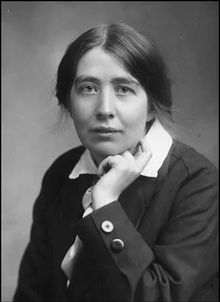
Sylvia Pankhurst
English activist, writer and artist (1882–1960) / From Wikipedia, the free encyclopedia
Dear Wikiwand AI, let's keep it short by simply answering these key questions:
Can you list the top facts and stats about Sylvia Pankhurst?
Summarize this article for a 10 year old
Estelle Sylvia Pankhurst (5 May 1882 – 27 September 1960) was an English feminist and socialist activist and writer. Following encounters with women-led labour activism in the United States, she worked to organise working-class women in London's East End. This, together with her refusal in 1914 to enter into a wartime political truce with the government, caused her to break with the suffragette leadership of her mother and sister, Emmeline and Christabel Pankhurst. Pankhurst welcomed the Russian Revolution and consulted in Moscow with Lenin. But as advocate of workers' control, she rejected the Leninist party line and criticised the Bolshevik dictatorship.
Sylvia Pankhurst | |
|---|---|
 A photograph of Pankhurst c. 1920 | |
| Born | (1882-05-05)5 May 1882 Old Trafford, Manchester, England |
| Died | 27 September 1960(1960-09-27) (aged 78) |
| Burial place | Holy Trinity Cathedral, Addis Ababa |
| Alma mater | Manchester School of Art Royal College of Art |
| Occupation(s) | Activist, writer, artist |
| Organisation(s) | Women's Social and Political Union, East London Federation of Suffragettes, Women's International League for Peace and Freedom, World Committee Against War and Fascism |
| Political party | Independent Labour Party, Workers' Socialist Federation, Communist Workers' Party |
| Children | Richard Pankhurst |
| Parent(s) | Richard Pankhurst Emmeline Goulden |
| Relatives | Christabel Pankhurst (sister) Adela Pankhurst (sister) Helen Pankhurst (granddaughter) Alula Pankhurst (grandson) |
Pankhurst was vocal in her support for Irish independence; for anti-colonial struggle throughout the British Empire; and for anti-fascist solidarity in Europe. Following its invasion by Italy in 1935, she was devoted to the cause of Ethiopia where, after the Second World War, she spent her remaining years as a guest of the restored emperor Haile Selassie. The international circulation of her pan-Africanist weekly The New Times and Ethiopia News was regarded by British colonial authorities as a factor in the development of African nationalism, and of the Rastafari movement in Jamaica.